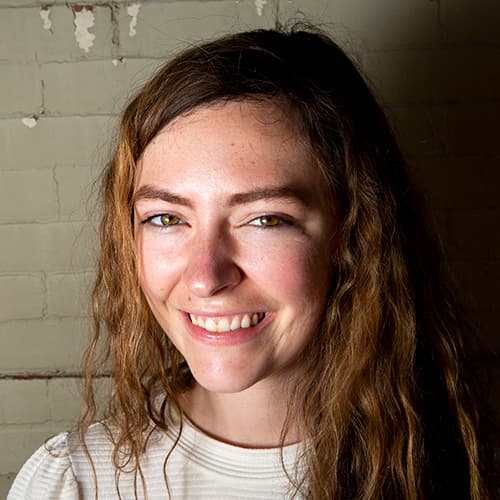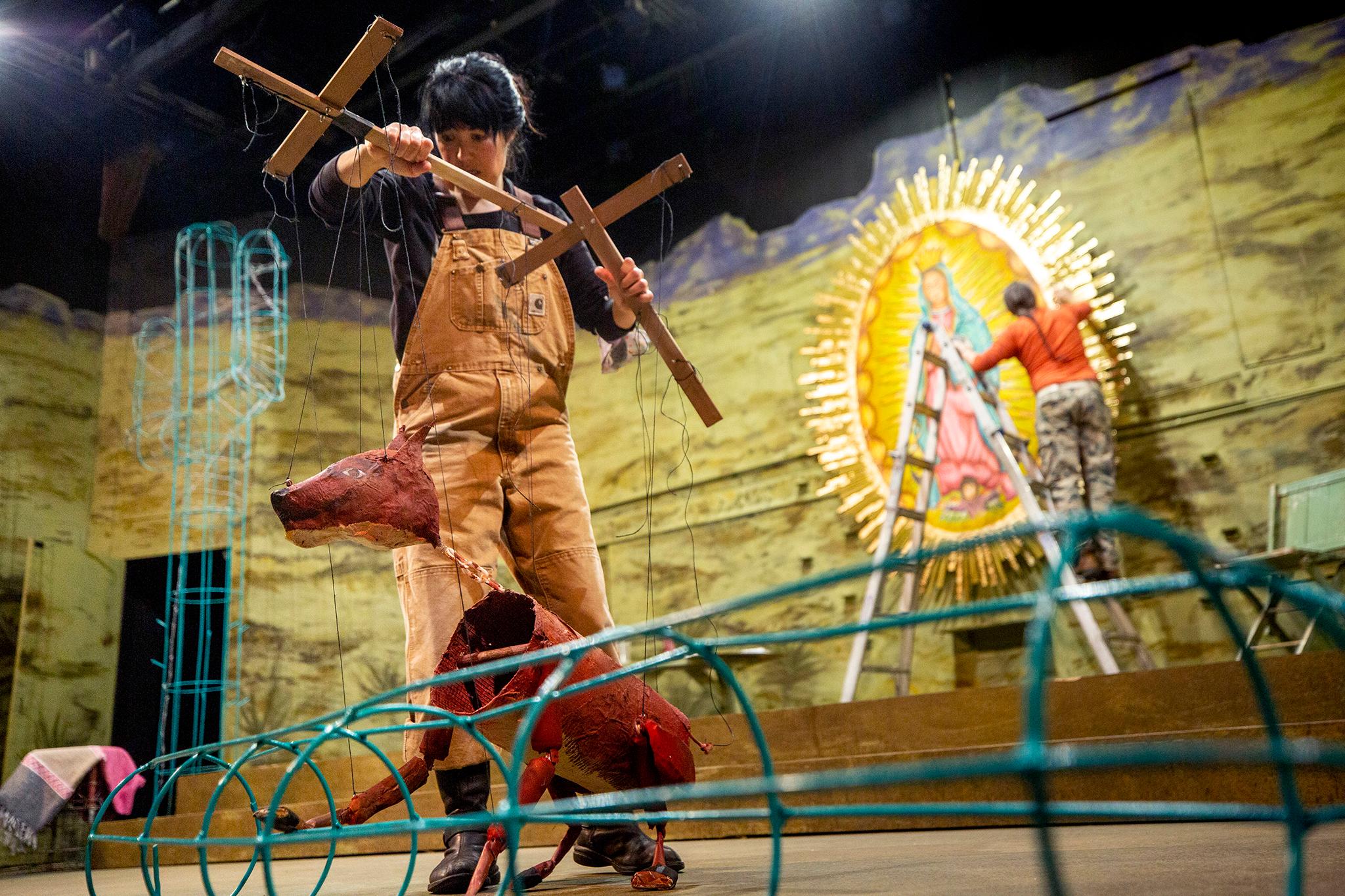Curious Theatre's boiler went out about two weeks ago -- two weeks before the world premiere of REFUGE, a play originally scheduled to debut in 2020, but which had already been pushed back several times due to the pandemic. So in the last few weeks, the cast and crew have been staging rehearsals in a different space each day, loading and unloading cars with props and materials to take to a new location, only to pack them back up again and repeat the following day.
Now that REFUGE's March 5 premiere date is approaching, the company is back in their Golden Triangle theatre space for tech rehearsals -- full run-throughs of the show's blocking, dialogue, music and lighting. Because the boiler is still broken, and on cold days the cast and crew bundle up in hats and gloves to rehearse for as long as they can before it gets too cold to continue. Now, the company is just hoping the boiler will be repaired in time for REFUGE's first preview performance on Thursday. They are determined that the show must go on. It has been a long time coming.
"I think that the people who have been working on it for years are so ready to see the play happen," said Dee Covington, the play's director and one of the theatre's founders. "No one wants to stop now."
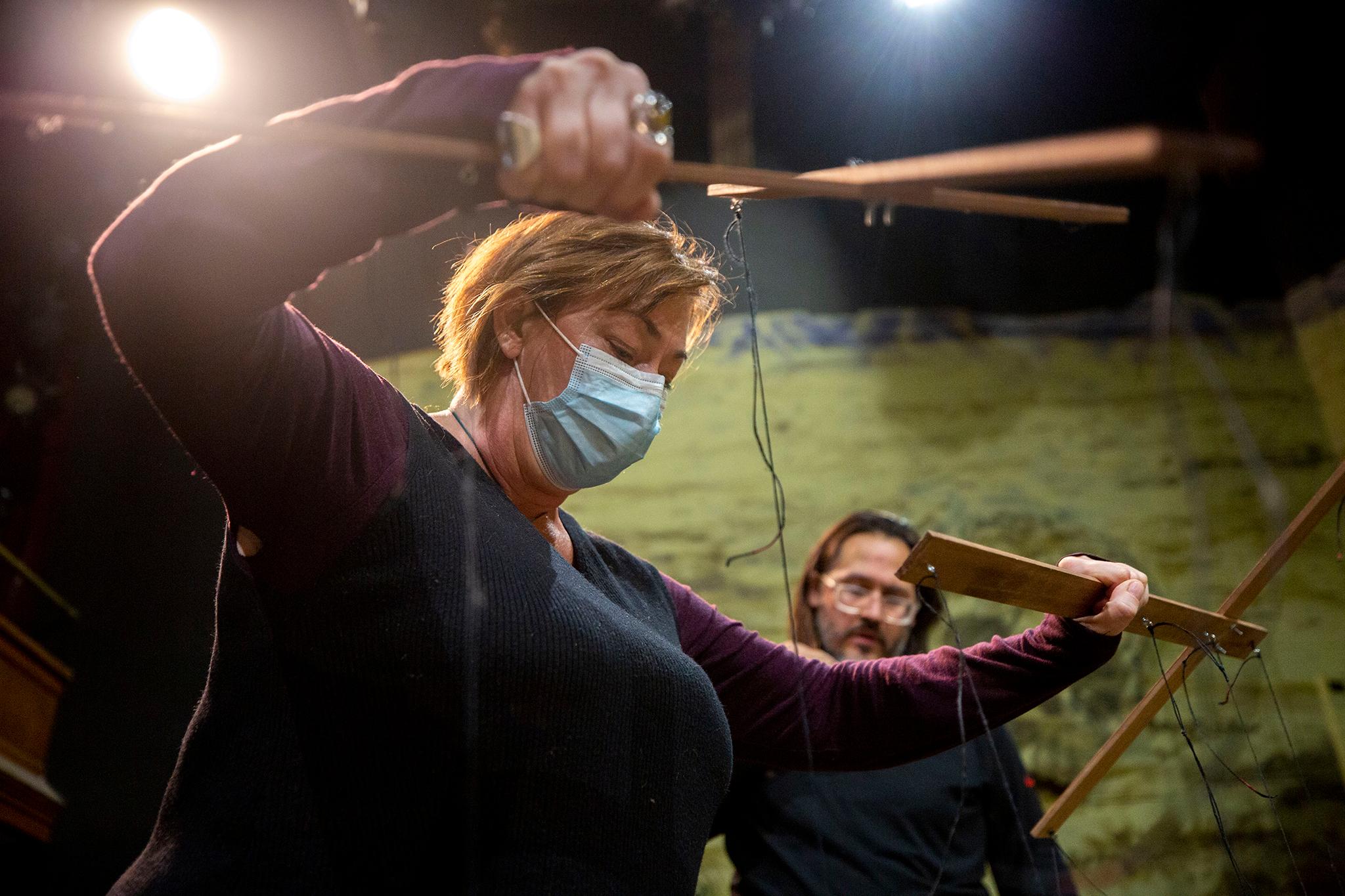
REFUGE tells the story of a Honduran teenage girl making the journey across the U.S.-Mexico border to reunite with her mother, who crossed the border years back and is now living in Florida.
The girl travels for 119 days, arriving at last in the harsh, unhospitable desert landscape of Texas, where she is discovered by an American rancher. The play uses magical realism, music, bilingual storytelling and puppetry to explore questions about what it means to be American. It's a story about resilience, about the unwelcoming atmosphere that greets many migrants into the U.S. and about political and psychological borders. But most of all, it is a story about the value of human life, and how empathy can help us overcome those borders.
Curious Theatre Company's motto is "No guts, no story." The motto refers to the company's social justice bent, but also to its tendency to choose scripts that present artistic challenges.
"When we get a script that we say, 'How in the world would you make that happen onstage?' That's when we lean into it," Covington said. REFUGE was one such play. The original script, penned by Andrew Rosendorf, communicated the harrowing experience of traveling through the desert mainly through stage directions, which are invisible to the audience.
"This is a play about the terrain. This is a play about the environment," Covington said. "So how do you bring this very rough, hot, unforgiving earth into the play?"
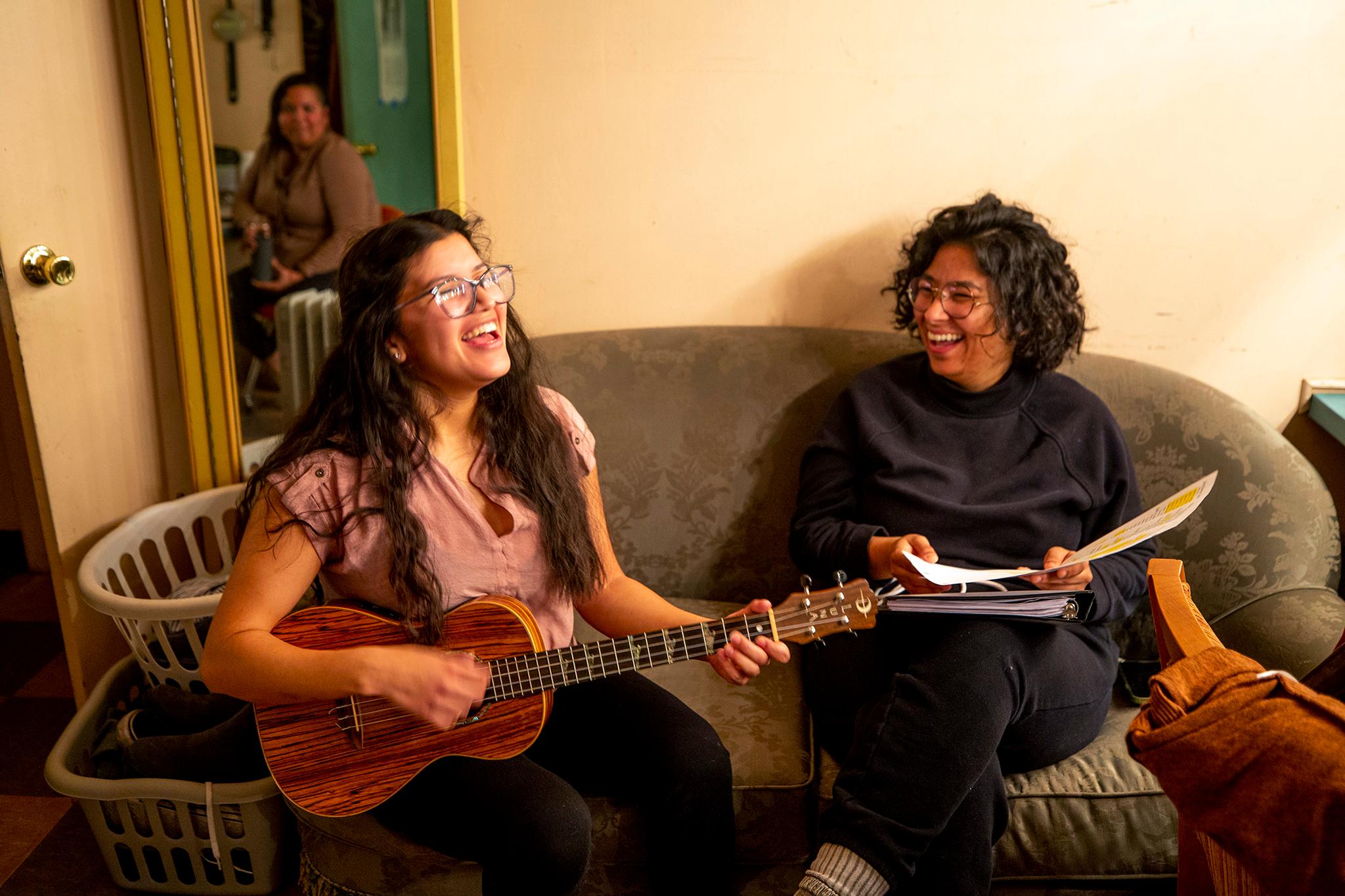
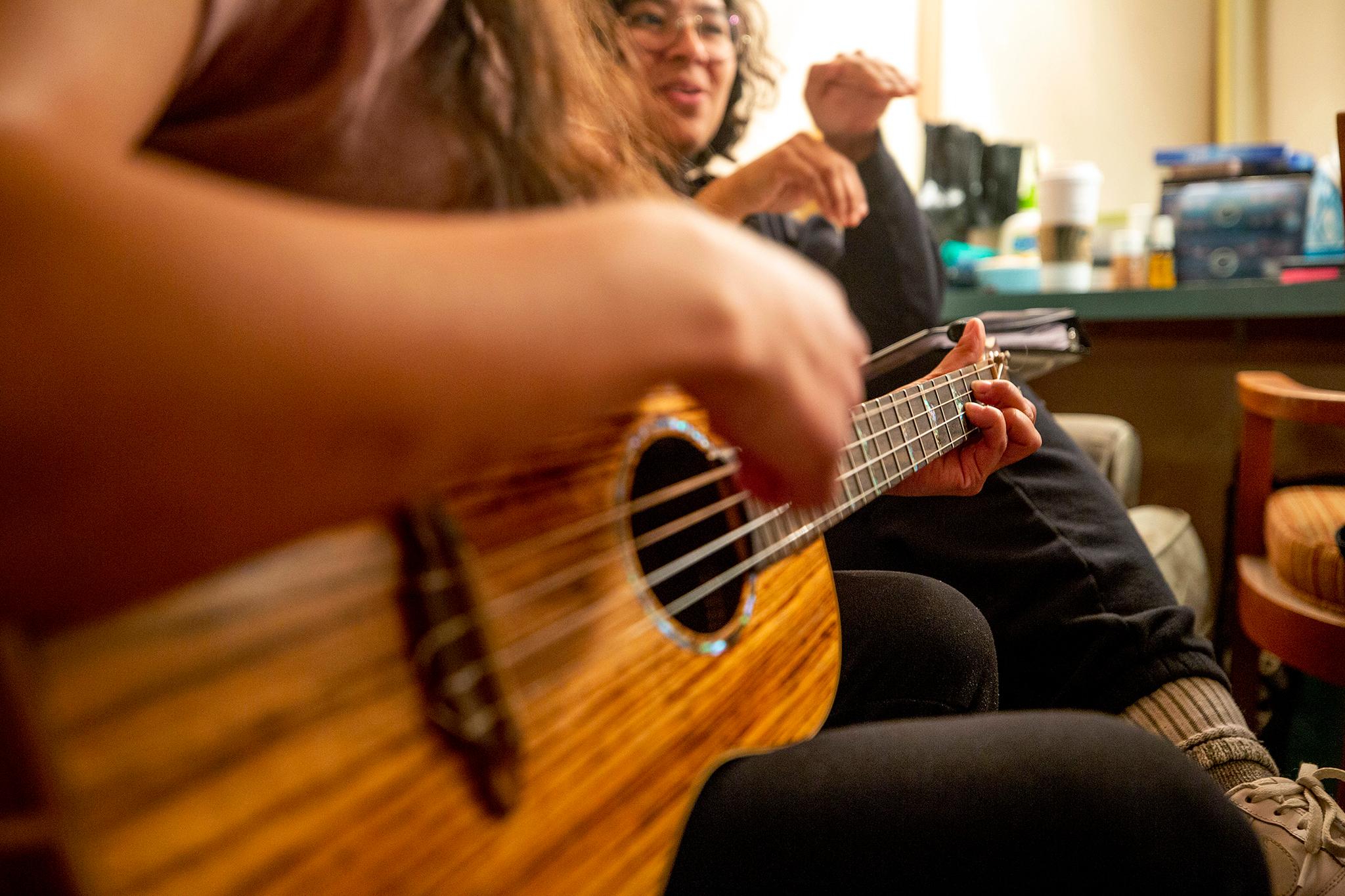
The creative team brought in Satya Jnani Chávez to write songs for REFUGE that might function as an atmospheric stand-in for the desert climate. As part of their research, the team also traveled to the border so that they could see that landscape for themselves. They met with organizations that aid migrants to better understand some of the challenges facing people who make the journey. And they interviewed ranchers who live near the border, many of whom told Curious that while they were not in favor of migrants crossing their land into the United States, they disliked finding dead bodies on their land even more. Many of them said they leave water out for migrants so they might survive the journey.
"The painful realities of people dying on your land surpass politics," Covington said. "There are political borders, and then there are also humanitarian needs."
The play is bilingual and written so that monolingual speakers of either Spanish or English might be able to understand what's happening.
The team took the show to Mexico to see if the story would hold in both languages, teaming up with Mexican actors, puppeteers and musicians to help them pick out sections where the dialogue was too English-heavy. It was important to the creative team to transcend an existing bilingual storytelling formula -- a somewhat prescriptive method in which one person says something in one language, and another person answers in the other language so audience members know what was said. Instead, monolingual speakers will pick up the story by tapping into a variety of methods of communication.
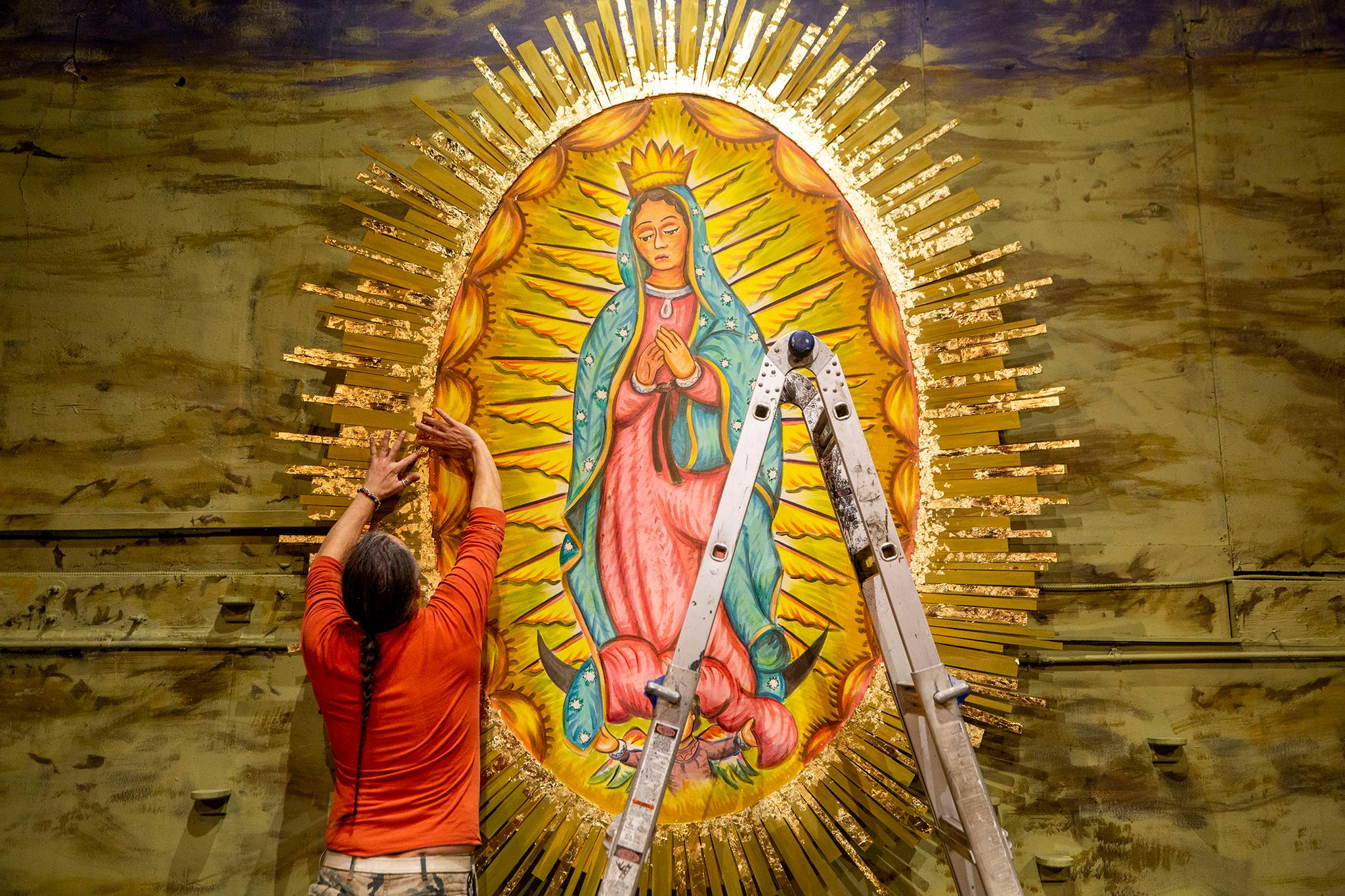
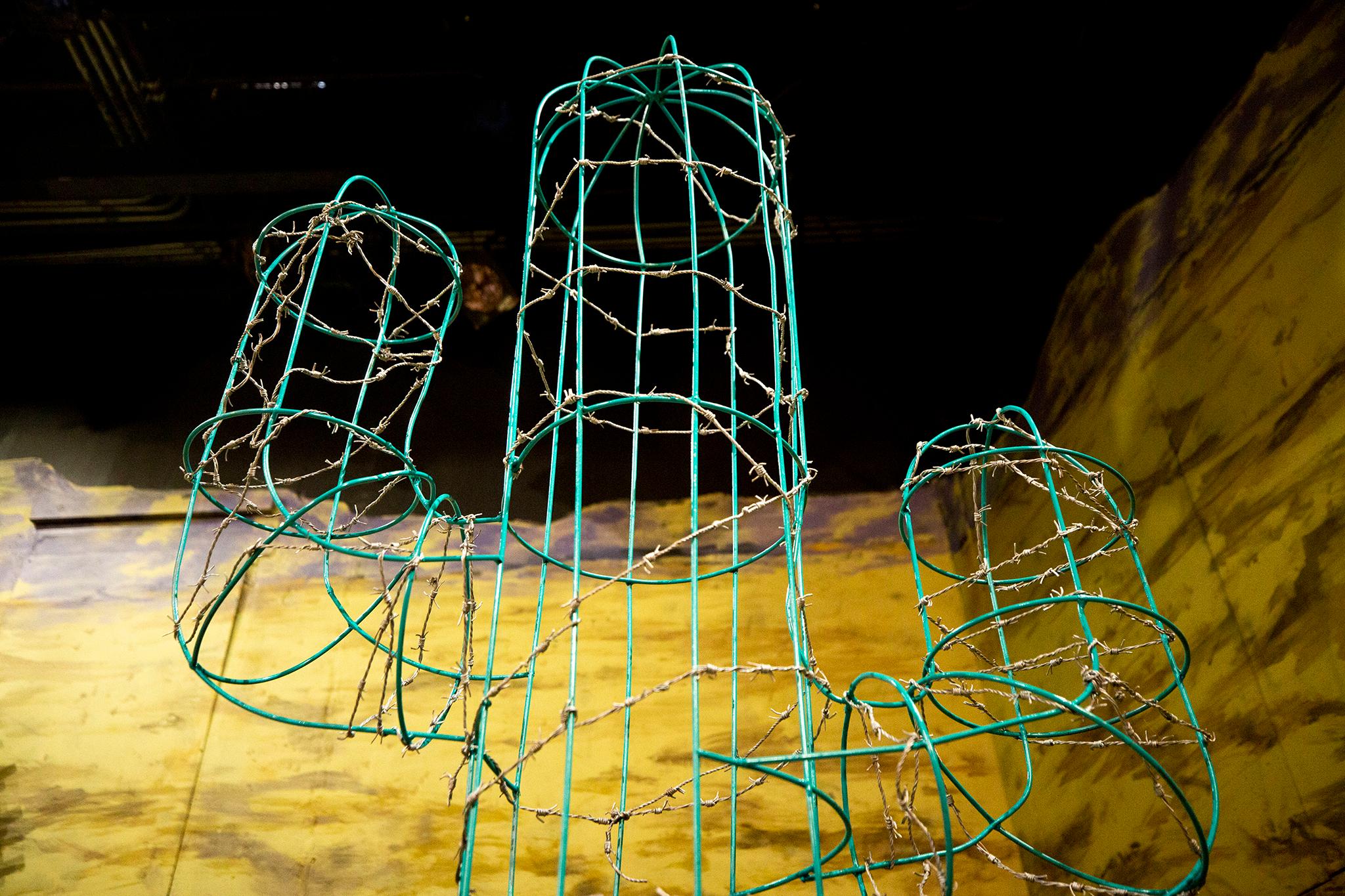
"This play has to speak English and Spanish, and it has to speak music, and it has to speak puppets," Covington said. "This play has a lot of languages."
Sometimes, Covington said, an audience member may have to grasp at words, as well as the essence and energy of a conversation, to understand what is being said.
"There'll be times when, either language, they'll just have to incubate a little bit of chaos and trust that the story will catch them up," Covington said. She said that chaos serves to help communicate the chaos and confusion of the protagonist's own life.
"I think that's part of the experience," Covington said. "For this young girl to cross this border as a Spanish speaker, what are her struggles to communicate in her language to an English speaker?"
Some of the play's characters are members of the animal world, represented as puppets designed by local artist Adolfo Romero.
"Their presence is always there in the desert," Covington said. "Things survive. There are people that don't survive, and yet somehow these animals survive this incredible climate and terrain."
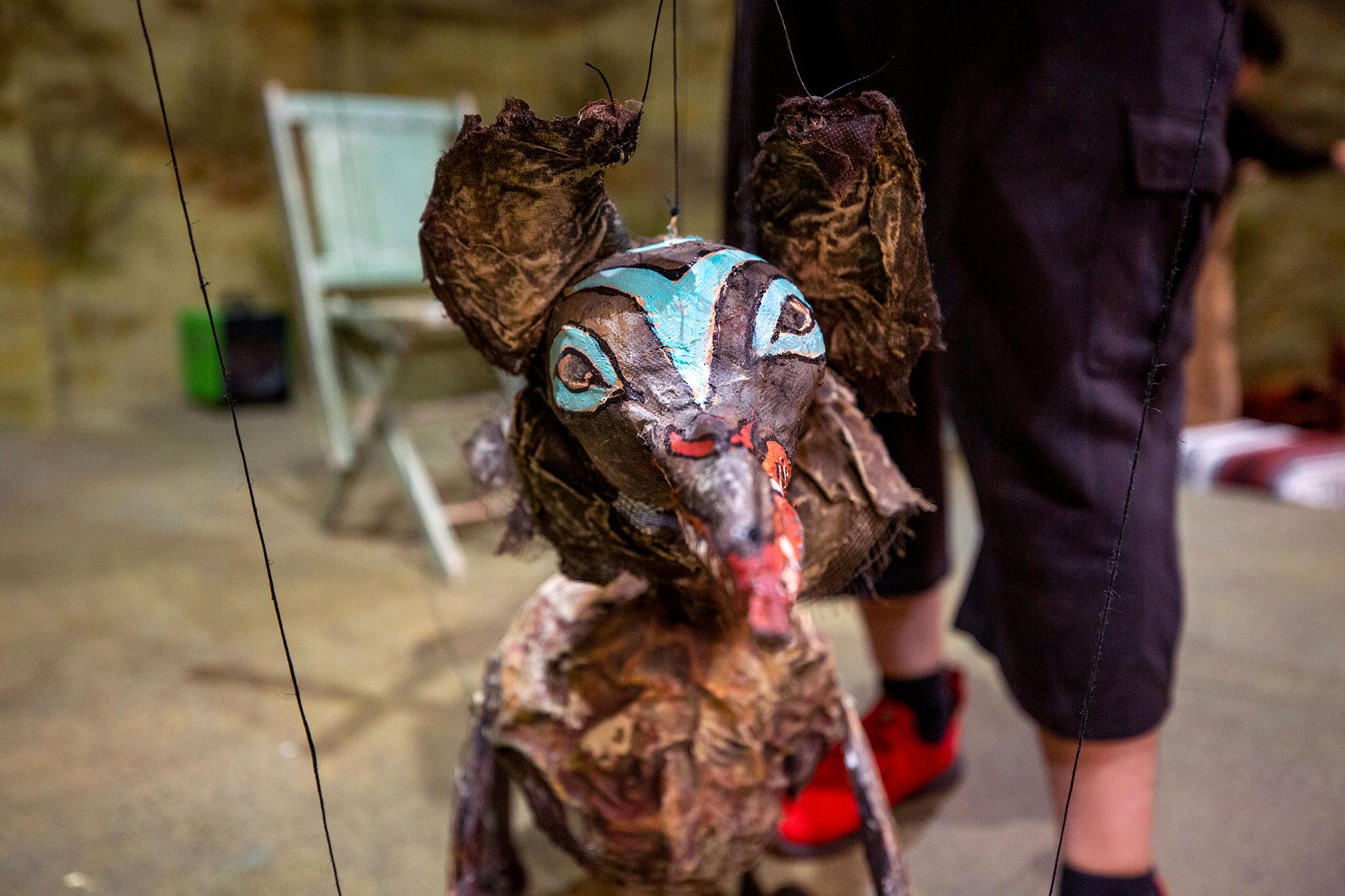
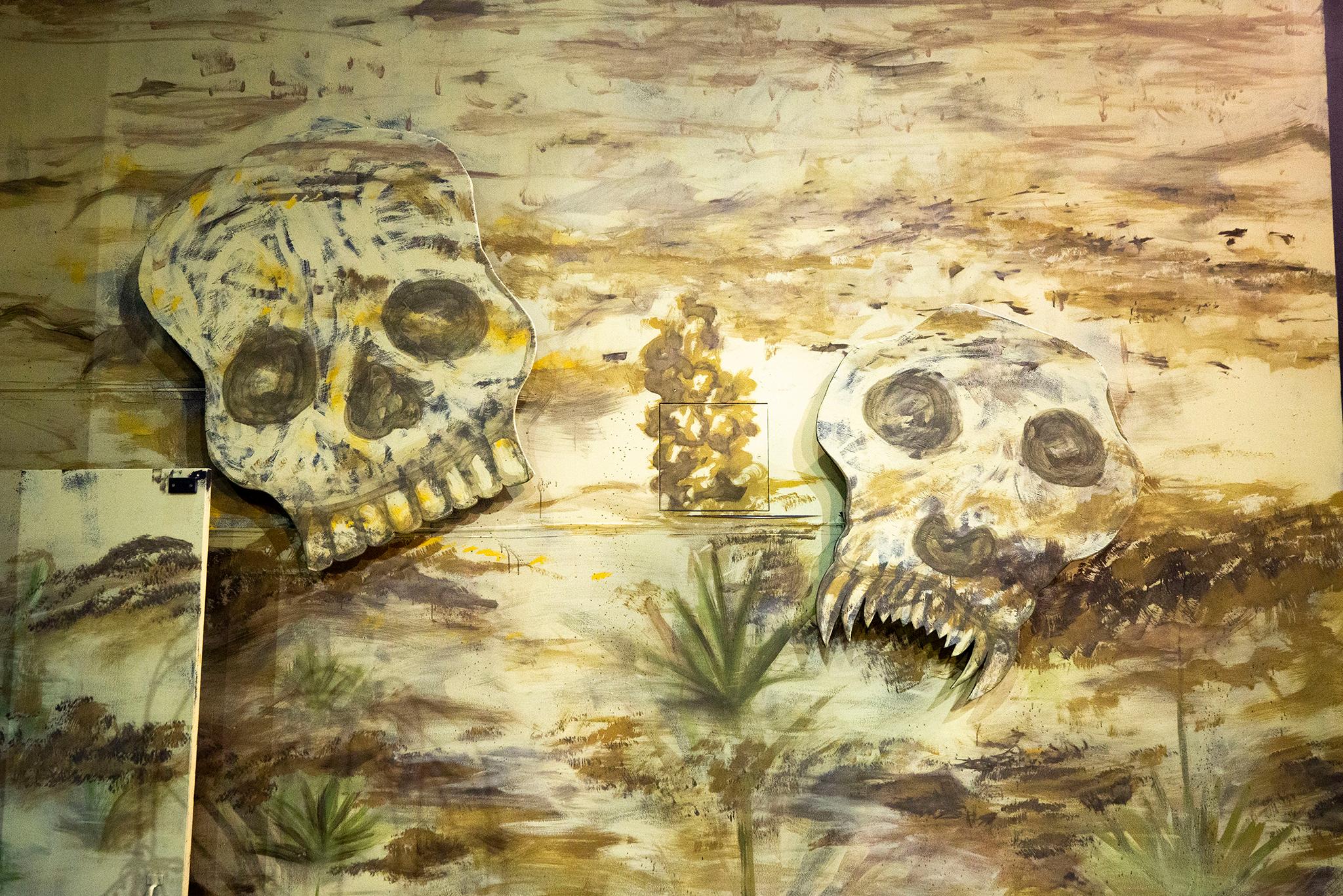
There's a rattlesnake, for instance, and a dog who belongs to the rancher. There's also a wolf, who represents the ever-present threat of hunger. Covington says that the wolf is himself always hungry, and claims that "hunger is the real evil."
"Hunger is a primal need," she said. "And I also believe it's true of these migrants -- that no one tries to cross into the United States without being hungry," whether it's for food, for their families or for safety.
"No one leaves home unless they have to," she said.
The presence of the puppets requires audiences to suspend some disbelief, contributing to an element of magical realism that permeates the show. For instance, there is a moment in which the chorus "reassembles" a woman who died while making her journey across the border.
"We're taking these pieces, and then we lie this woman on the ground," Covington said. "And now we ask you to see this woman here, and then we ask you to feel for this woman here, "
The woman's story offers an alternate ending for the young protagonist, who manages to survive the journey in large part because the rancher found her in time.
"I think [the woman] serves as a reminder that there are many migrants who've tried to cross who have died and will remain unidentified," Covington said. In the play, these figures become "the bones of the desert," enfolded into the very land that killed them.
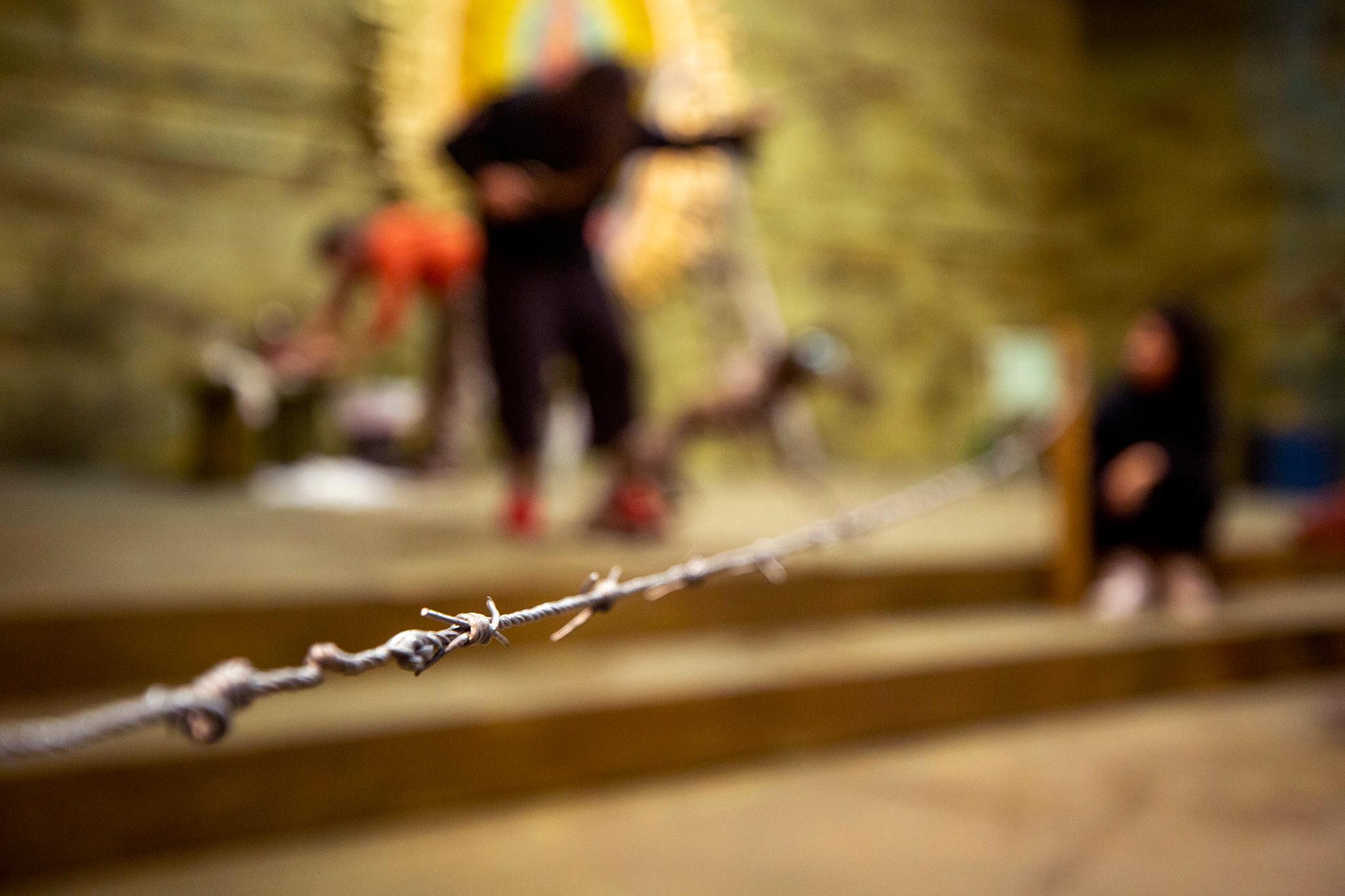
A lot has changed in the time since REFUGE was originally scheduled to premiere. We've experienced a global pandemic, a racial justice movement, a transition to a new administration. We are still coming to terms with the many ways in which we ourselves have changed in the last few years in response to the changes that've occurred around us.
Still, Covington said, in terms of the border crisis and the issues REFUGE touches on, not much has changed. The play may have been planned for a 2020 debut, but she says it is still just as relevant in 2022.
According to data from the Pew Research Center, the U.S. Border Patrol reported more than 1.6 million encounters with migrants along the U.S.-Mexico border in 2021 -- the highest number on record. Most of those encounters led to expulsion from the U.S.
Meanwhile, only a fraction of refugees are granted asylum each year. Per immigration data gathered by Syracuse University, in 2020, about 26.3% of refugees seeking asylum were approved- down from 2019. The rate of percent of refugees denied asylum has declined a bit under Biden, from 71% in 2020 to 63% in 2021, but because courts are partially closed due to the pandemic, the total number of asylum decisions declined in 2021.
Covington said she hopes REFUGE can help audiences connect to the immigration crisis on a human level.
"We need to put a face and a story that's more personal to these people," she said. "Because if people are fleeing extreme circumstances and need support, as long as we other them and say, 'You don't belong here,' or, 'We don't have room for you, or, 'Stop taking our jobs,' as long as we draw those sort of psychological borders, it enables us to not really see people and solve problems.
"The artist in me hopes that people really experience this magical story," she said. "I hope they see the resilience of the human spirit and the connectedness of all of us."
REFUGE runs from March 5 - April 9 at Curious Theatre, 1080 Acoma St. You can purchase tickets online.
